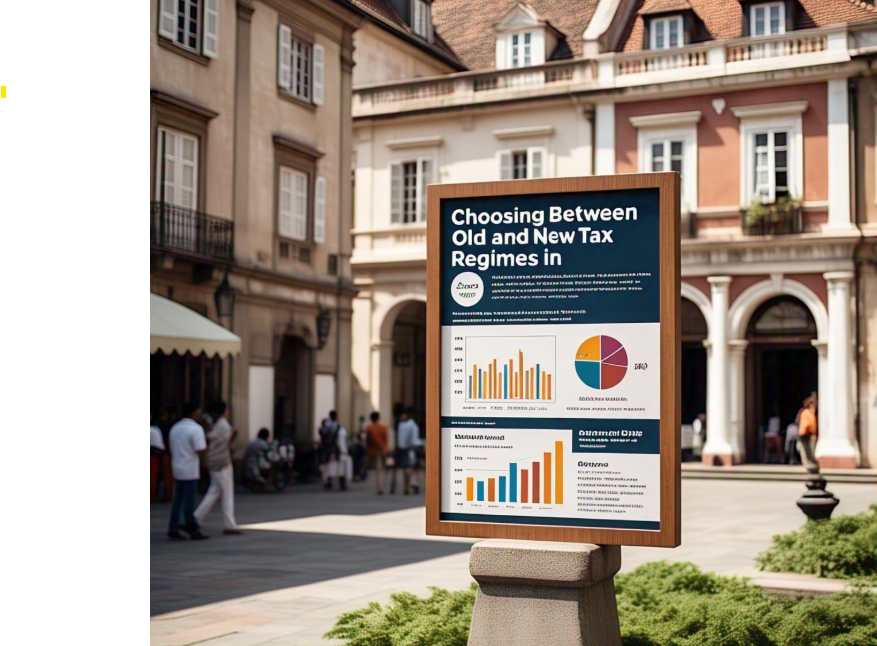Choosing Between the Old and New Tax Regimes, Can you switch back or switch out? it is not that easy !!
Every year, taxpayers in India face a crucial decision stick with the old tax regime, which offers deductions and exemptions, or opt for the new tax regime, which has lower tax rates but fewer benefits. Choosing the right one can impact how much tax you pay and how you plan your finances.
Post last updated: March 6, 2025

Choosing Between the Old and New Tax Regimes in India: A Practical Guide
Every year, taxpayers in India face a crucial decision: stick with the old tax regime, which offers deductions and exemptions, or opt for the new tax regime, which has lower tax rates but fewer benefits. Choosing the right one can impact how much tax you pay and how you plan your finances.
This guide breaks it down in a simple and practical way, with real-life examples and answers to common questions.
Salaried Employees: The Freedom to Choose Every Year
If you're a salaried employee, you get the flexibility to pick your tax regime at the beginning of each financial year. If you don’t inform your employer, they'll automatically deduct tax under the new tax regime.
But don’t worry—even if your TDS is deducted under the new regime, you can switch to the old tax regime when filing your Income Tax Return (ITR) and claim a refund if necessary.
Example: How Amit Chooses His Tax Regime
Amit earns ₹12 lakh per year. He’s confused about which tax regime is better for him.-
Under the old tax regime, he can claim deductions like:
- ₹1.5 lakh under Section 80C (for investments like EPF, PPF, ELSS, etc.)
- ₹25,000 under Section 80D (health insurance premium)
- ₹2 lakh under Section 24(b) (home loan interest payment)
- ₹50,000 standard deduction
With these deductions, his taxable income reduces significantly, lowering his overall tax.
-
Under the new tax regime, he can’t claim any deductions but benefits from lower tax rates.
If Amit's employer deducts TDS under the new regime but later he realizes the old regime would save him more money, he can switch to the old regime when filing his ITR and request a refund for any excess tax paid.
Business Owners & Professionals: Limited Switching Flexibility
If you earn income from business or freelancing, you don’t have the same flexibility as salaried employees. Once you opt out of the new tax regime, you can switch back to it only once in your lifetime.
Example: Neha’s Decision as a Business Owner
Neha is a self-employed graphic designer earning ₹18 lakh annually.- She starts off with the new tax regime because she doesn’t have many tax-saving investments.
- A few years later, she begins investing in PPF, health insurance, and home loans, making the old tax regime more beneficial.
- If she switches to the old tax regime, she won’t be able to return to the new one again.
Since business professionals get only one chance to switch back, they need to think carefully about their long-term financial plans.
How to Decide? Key Factors to Consider
✅ Do you claim deductions?
- If you invest in tax-saving schemes (80C, 80D, home loan, etc.), the old tax regime is usually better.
- If you don’t claim deductions, the new tax regime may be a better fit due to its lower tax rates.
✅ Do you have business income?
- Salaried employees can change tax regimes every year.
- Business owners can only switch back to the new regime once.
✅ Are you planning for retirement?
- If you actively invest in PPF, NPS, EPF, the old tax regime may be more suitable.
✨ Make an Informed Decision Easily
For a precise calculation of your tax liabilities under both regimes, visit our 👉 Income Tax Calculator 🌟. This user-friendly tool provides a detailed breakdown of your tax savings, helping you confidently choose the right regime.
Frequently Asked Questions!
1. Can I switch between tax regimes every year?
- Salaried employees: Yes, they can switch every year.- Business owners: No, they can only switch back to the new regime once.
2. What if I forget to tell my employer my tax regime preference?
- Your employer will deduct TDS under the new regime by default. - But don’t worry—you can still switch to the old regime while filing your ITR and get a refund.3. Is the new tax regime always better?
- No, it depends on your deductions. If you claim many exemptions, the old regime is better. - If you prefer simpler tax filing with lower rates, the new regime may be a good option.4. How can I compare my tax liability under both regimes?
- Use www.fincalci.com income tax calculator or consult a tax expert to see which regime benefits you the most.5. What if I was self-employed but later took a salaried job?
- If you previously opted out of the new tax regime as a business owner, you cannot return to it even if you later become a salaried employee.Conclusion!
The best tax regime depends on your individual financial situation**. If you’re a salaried employee, you have the flexibility to switch every year. If you’re a business owner, you must decide wisely, as switching options are limited.
Have questions or need support? Feel free to reach out to us!
Email: admin@fincalci.com
Author:





